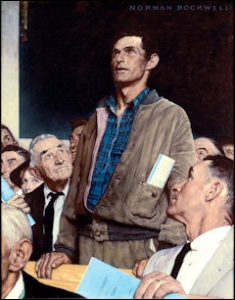
Norman Rockwell, “Freedom of Speech,” 1943.
The following position paper was published by Partners for College Affordability and Public Trust, a sponsor of the Bacon’s Rebellion blog.
ISSUE: Public Comment for Virginia’s Colleges and Universities
PROBLEM: Currently, the decision to raise tuition and fees on students of Virginia colleges and universities is done without any required public input. Yet rate-setting is one of the most important and consequential responsibilities that any policy board possesses. That’s why the law gives citizens the right to address their respective city council or local board of supervisors – the stereotypical 3 minutes at the podium – prior to these policy bodies setting the local property tax rate.
But the opportunity to provide public comment to inform public decision-making goes well beyond local elected bodies. This right of citizens extends to many appointed policy bodies in Virginia.*
The fact that the affected public, including student and parent consumers, have no say in rate-setting in some of Virginia’s largest enterprises (state colleges and universities) is an exception of the law and defies basic expectation of regular appointed policy bodies in the Commonwealth and their treatment of citizens.
OPPORTUNITY: Creating the expectation that appointed governing bodies of Virginia public colleges and universities at least consider the input of the public prior to setting the tuition-rate would be a fundamental improvement in their governance and responsiveness to the Commonwealth they serve.
This policy would align the practices of college and university governing boards with the existing requirements of other appointed boards in the Commonwealth.
In addition, at least ten other U.S. states (Arizona, California, Hawaii, Missouri, Montana, Nebraska, Oklahoma, Texas, Utah, Washington) require public comment as part of governing board meetings.
SOLUTION: Require governing bodies of Virginia public colleges and universities to adopt public participation policies that include public comment periods at board meetings. In 2017, the Virginia General Assembly passed a law (SB1376, unanimous vote in both chambers) that requires colleges and universities to notify the public about their plans to increase tuition. The next logical step, is requiring public comment prior to those decisions.
============================
*The legal requirement for public participation/comment includes, but is not limited to, the following appointed Virginia state boards and commissions (links to statutes):
The State Board of Elections
The Commission on Local Government
The Milk Commission
The Board of Conservation and Recreation
Virginia Soil and Water Conservation Board
State Council of Higher Education for Virginia
State Air Pollution Control Board
Virginia Aviation Board
Virginia Waste Management Board
State Water Control Board
Motor Vehicle Dealer Board
Commonwealth Transportation Board
Commission of the Virginia Alcohol Safety Action Program
Apprenticeship Council
Virginia Workers Compensation Commission
Safety and Health Codes Board
Virginia Employment Commission
Virginia Manufactured Housing Board
Board of Historic Resources


